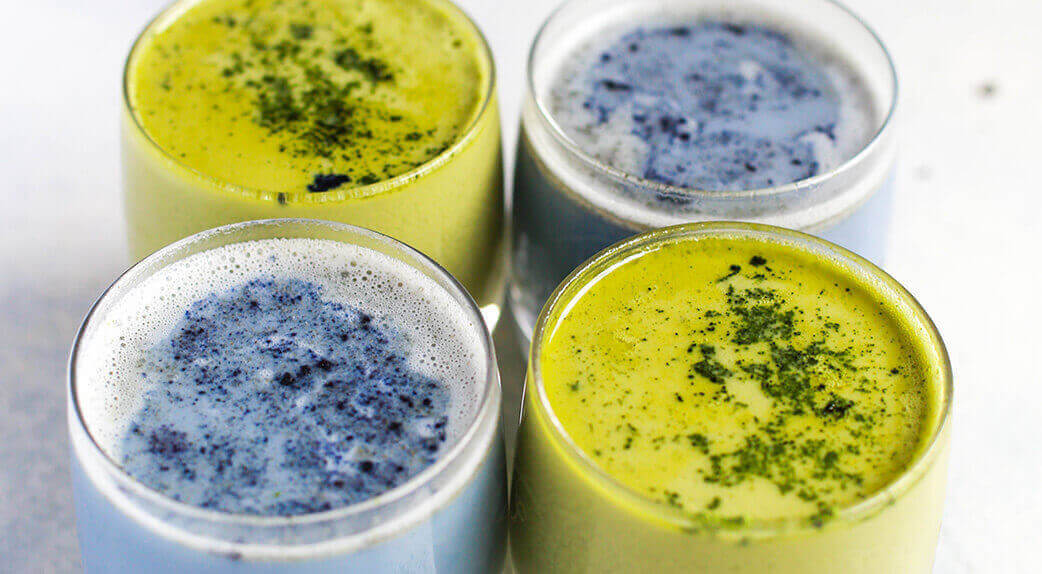Matcha tea, which comes in the form of an intense green powder, is known for its energizing power. It is the only tea in the world where the leaf is consumed entirely. In fact, during the preparation process, hot water dilutes the powder to produce a smooth, bright green mixture. Matcha is becoming more and more popular in the West as it is a good alternative to coffee and more traditional tea. But what is its origin? What plant does this powder come from? Go back in time with Kusmi and discover its history.

Where does matcha tea come from?
Matcha tea powder is appreciated for its intense taste and stimulating effect, thanks to the caffeine contained in the leaves. Long before tea existed, its leaves were used as a medicine.
Matcha comes from Japan
The first matcha green tea seeds are said to have been introduced to Japan in 1191 by the Zen monk Eisai. He is said to have planted them in the garden of the Buddhist temple in Kyoto. He was the first person to grind the green tea leaves after harvesting them and to consume them as a hot drink. The resulting green powder gave rise to the Japanese tea ceremony. Today, matcha is one of the most popular teas consumed by the Japanese!
The tea ceremony
In the Zen philosophy of Japan, the tea ceremony aims to celebrate the beauty of the world and simple things. For these purist monks, matcha, which is green tea powder, is at the heart of this ceremony. It stimulates the mind by bringing calm through meditation. Today, the benefits of green tea are recognised throughout the world.
Harvesting the matcha plant
The leaves of the tea plant from the first blossoms are picked one by one by hand. They are grown in the shade to increase the chlorophyll content. This gives the matcha its intense green colour.
After this oxidation stage, the leaves are air-dried before being ground between two granite millstones. The result is a jade green powder.
1. Ceremonial matcha
Made from the first leaves of the Japanese tea plant, it is consumed on its own mixed with simmering water. Be sure to sift it well and let it infuse for a few minutes before tasting it. Discover Kusmi Tea's organic matcha ceremony
The health benefits of matcha green tea
Sometimes called the prince of green teas, matcha is a powerful antioxidant. Made up of catechins, it is said to help fight the development of certain diseases and premature ageing of cells. Thanks to its caffeine content, it is also known to help fight against fatigue.
After Buddhists, samurais and Asian emperors, it is now the turn of Westerners to enjoy this beneficial drink.
How is matcha prepared?
In accordance with Japanese tradition, matcha tea should be mixed with hot water before drinking. However, the temperature of the water is very important in order not to degrade the powder and to ensure that it retains all its benefits. We recommend that you do not exceed a water temperature of 80°C.
The Japanese origin of matcha: a guarantee of quality
A good matcha tea comes from Japan! Indeed, the country ensures strict quality controls. Of course, there are matcha teas from elsewhere, but their quality is less reliable.
To go further: Our guide to buying quality matcha
Kusmi Tea, an organic matcha made in France
Matcha is carefully selected by our Kusmi experts to offer you a quality tea. All our teas are made in Normandy and certified organic to meet our commitment to eco-responsible agriculture. Choose your flavoured organic matcha according to your taste and your desires!
The tea plant originated in China, but the matcha tea plant was imported to Japan by a Zen master. The tea plant grows at high altitudes and its leaves and buds are picked by hand. Matcha is a ground green tea, retaining all its nutrients and flavours. Take a moment to relax and enjoy a
At Kusmi, we can't recommend you enough to try this drink with its many health benefits. An alternative to coffee or traditional tea, it will delight the most refined and delicate palates. To be sure to choose a quality matcha tea, choose a Japanese origin.
Read also on the same theme :

